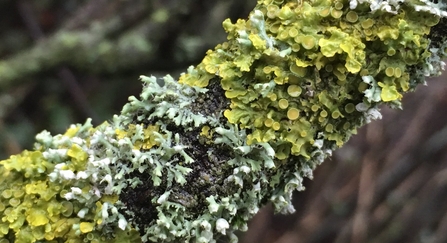
Celebrating Elke Mackenzie: Explorer, scientist and lichenologist, in honour of LGBTQ+ History Month

LGBTQ+ History Month
LGBTQ+ History Month is celebrating its 20th anniversary in the UK. It is a time to raise awareness and combat prejudice against the LGBTQ+ community, all while celebrating its achievement, diversity and increasing visibility. LGBTQ+ History Month has its origins in the USA where they celebrate in October. Here in the UK we hold it in February to celebrate the 2003 abolition of Section 28, which had banned the ‘promotion and teaching of homosexuality’ in schools and public life (banned in 2000 in Scotland, go you guys!).
This year’s theme, ‘Activism and social change’, is one we at The Wildlife Trusts are truly invested in. Each year, five people from history are selected to help inform people about the contribution that LGBTQ+ people have made to society.
A transgender icon of natural history
There are so many fascinating people who have done amazing work in all kinds of sectors, but those stories have often been missing from official records. People who identify as LGBTQ+ might struggle to find historical figures they relate to, leading them to feel isolated and uncertain about their own future. The truth is we have always been here and by talking about our history it reinforces that we aren’t going anywhere, and that LGBTQ+ people are valuable and vital members of society.
So we want to introduce you to a woman who worked in natural sciences, and who’s work may even be relevant to some people working with The Wildlife Trusts to this day: Elke Mackenzie, a botanist with a speciality in lichenology.
Elke Mackenzie
Born in London in 1911, but raised in Scotland, Mackenzie graduated with a degree in Botany from Edinburgh University, before continuing her studies at University of Munich. She went on to work at the British Museum in charge of the Lichen Herbarium, and during the Second World War participated in covert Antarctic expeditions where she collected many new-to-science species of lichen.
Elke was highly respected within her field but in the 1960’s increasingly suffered from mental health issues. In 1971 she was diagnosed with gender dysphoria and transitioned, starting then to introduce herself as Elke Mackenzie (previously known as I.M Lamb within the field of botany). Unfortunately, the academic world was not very understanding at the time and, according to a friend, she was forced to leave her work as the Director of the Farlow Herbarium at Harvard University, taking early retirement. Elke began to lose interest in the field of botany later in life and while most of her published articles appeared in her previous name, one of her final papers included an acknowledgment of herself, with thanks to ‘Miss Elke Mackenzie for technical and bibliographic assistance in the preparation of this paper’.

Lichen by Tom Hibbert
Elke was so well respected that two genera of lichen and nine lichen species are named after her. Additionally, Cape Lamb on Vega island, Antarctica, where she had studied lichens earlier in her career, has been named after her. In her obituaries Elke is spoken of fondly, with many people praising both her personality and work ethic, though mainly remembered incorrectly as male. She is also one of a short list of female winners of a Polar medal.
Elke Mackenzie’s life is truly impressive. Her career and place in history as a naturalist, botanist and explorer is something many of us could only dream of. While her work suffered from other people’s response to her transition later in life, it is clear that she continued to contribute by translating botanical texts and taking up other hobbies. Elke is an icon of LGBTQ+ history for her achievements and a real inspiration to all of us who work in the natural sciences. She is also a reminder of the true dedication and scientific expertise we can lose when we reject a member of our conservation community due to their identity.
Significant sources:
https://alumni.ed.ac.uk/services/notable-alumni/alumni-in-history/elke-mackenzie
https://www.kew.org/read-and-watch/elke-mackenzie

